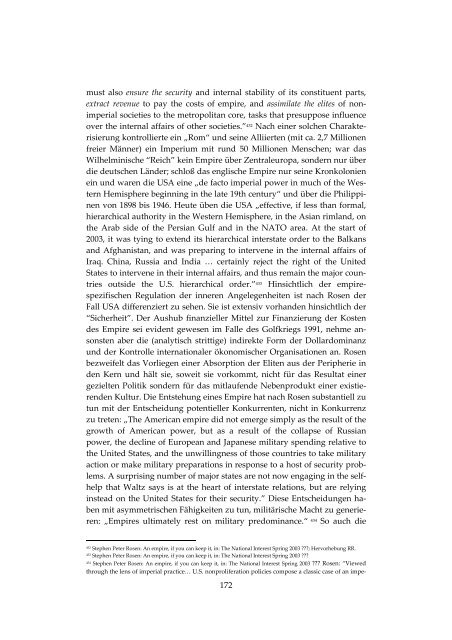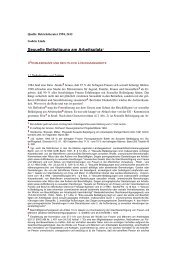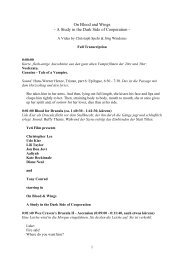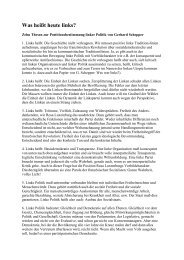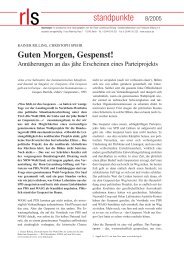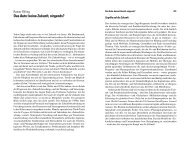outbreak. let's take over. american empire als wille ... - Rainer Rilling
outbreak. let's take over. american empire als wille ... - Rainer Rilling
outbreak. let's take over. american empire als wille ... - Rainer Rilling
Sie wollen auch ein ePaper? Erhöhen Sie die Reichweite Ihrer Titel.
YUMPU macht aus Druck-PDFs automatisch weboptimierte ePaper, die Google liebt.
must <strong>als</strong>o ensure the security and internal stability of its constituent parts,<br />
extract revenue to pay the costs of <strong>empire</strong>, and assimilate the elites of nonimperial<br />
societies to the metropolitan core, tasks that presuppose influence<br />
<strong>over</strong> the internal affairs of other societies.” 432 Nach einer solchen Charakterisierung<br />
kontrollierte ein „Rom“ und seine Alliierten (mit ca. 2,7 Millionen<br />
freier Männer) ein Imperium mit rund 50 Millionen Menschen; war das<br />
Wilhelminische “Reich” kein Empire über Zentraleuropa, sondern nur über<br />
die deutschen Länder; schloß das englische Empire nur seine Kronkolonien<br />
ein und waren die USA eine „de facto imperial power in much of the Western<br />
Hemisphere beginning in the late 19th century“ und über die Philippinen<br />
von 1898 bis 1946. Heute üben die USA „effective, if less than formal,<br />
hierarchical authority in the Western Hemisphere, in the Asian rimland, on<br />
the Arab side of the Persian Gulf and in the NATO area. At the start of<br />
2003, it was tying to extend its hierarchical interstate order to the Balkans<br />
and Afghanistan, and was preparing to intervene in the internal affairs of<br />
Iraq. China, Russia and India … certainly reject the right of the United<br />
States to intervene in their internal affairs, and thus remain the major countries<br />
outside the U.S. hierarchical order.” 433 Hinsichtlich der <strong>empire</strong>spezifischen<br />
Regulation der inneren Angelegenheiten ist nach Rosen der<br />
Fall USA differenziert zu sehen. Sie ist extensiv vorhanden hinsichtlich der<br />
“Sicherheit”. Der Aushub finanzieller Mittel zur Finanzierung der Kosten<br />
des Empire sei evident gewesen im Falle des Golfkriegs 1991, nehme ansonsten<br />
aber die (analytisch strittige) indirekte Form der Dollardominanz<br />
und der Kontrolle internationaler ökonomischer Organisationen an. Rosen<br />
bezweifelt das Vorliegen einer Absorption der Eliten aus der Peripherie in<br />
den Kern und hält sie, soweit sie vorkommt, nicht für das Resultat einer<br />
gezielten Politik sondern für das mitlaufende Nebenprodukt einer existierenden<br />
Kultur. Die Entstehung eines Empire hat nach Rosen substantiell zu<br />
tun mit der Entscheidung potentieller Konkurrenten, nicht in Konkurrenz<br />
zu treten: „The American <strong>empire</strong> did not emerge simply as the result of the<br />
growth of American power, but as a result of the collapse of Russian<br />
power, the decline of European and Japanese military spending relative to<br />
the United States, and the unwillingness of those countries to <strong>take</strong> military<br />
action or make military preparations in response to a host of security problems.<br />
A surprising number of major states are not now engaging in the selfhelp<br />
that Waltz says is at the heart of interstate relations, but are relying<br />
instead on the United States for their security.” Diese Entscheidungen haben<br />
mit asymmetrischen Fähigkeiten zu tun, militärische Macht zu generieren:<br />
„Empires ultimately rest on military predominance.“ 434 So auch die<br />
432<br />
Stephen Peter Rosen: An <strong>empire</strong>, if you can keep it, in: The National Interest Spring 2003 ???; Hervorhebung RR.<br />
433<br />
Stephen Peter Rosen: An <strong>empire</strong>, if you can keep it, in: The National Interest Spring 2003 ???<br />
434<br />
Stephen Peter Rosen: An <strong>empire</strong>, if you can keep it, in: The National Interest Spring 2003 ??? Rosen: “Viewed<br />
through the lens of imperial practice… U.S. nonproliferation policies compose a classic case of an impe-<br />
172


